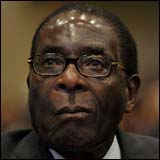
ABOVE: Robert Mugabe
A report in the Zimbabwe Herald, the state-owned mouthpiece for the Mugabe dictatorship, provides an entertaining, if somewhat fictive, account of the recently concluded Zimbabwe Diamond Conference in Victoria Falls. The purpose of the conference was to provide some support for the diamond industry in Zimbabwe which, although free of Kimberly Process Certification issues, is severely crippled by economic sanctions imposed by the U.S. Office of Foreign Assets Control against the Mugabe regime.
The pro-Mugabe news outlet had this to say:
KIMBERLEY Process Certification Scheme chairperson Mrs Gillian Milovanovic yesterday came under fire from delegates attending the inaugural Zimbabwe Diamond Conference here for failing to protect Zimbabwe’s diamond industry from America. Delegates expressed concern that Zimbabwe’s diamond sector continues to face obstacles despite the country receiving the KP’s nod to trade its gems.
They unanimously agreed that the American approach towards Zimbabwe’s gems sought to promote conflict diamonds.
During an open session, delegates said Mrs Milovanovic, who is American, should recuse herself from chairing the KP because she was failing to protect Zimbabwe from America’s Office of Foreign Assets Control sanctions.
This blog has noted before that the Kimberly Process certification and OFAC sanctions against the Zimbabwe Mining Development Corporation (“ZMDC”), which has a monopoly on sales of Zimbabwe diamonds, deal with completely separate issues.
The Kimberly Process certification is limited to finding that the certified diamonds are not conflict diamonds, which are defined as ‘“rough diamonds used by rebel movements or their allies to finance conflict aimed at undermining legitimate governments.†Obviously, Zimbabwe diamonds aren’t being used to undermine a legitimate government; indeed, they are being used to prop up the existing dictatorial regime in Zimbabwe.
The OFAC sanctions, however, arise not from any insurgency or rebel conflict in Zimbabwe. Instead, they are premised on human rights abuses by the Zimbabwe dictatorship. In the case of ZMDC, OFAC sanctions are presumably a response to documented reports of torture and forced labor in the diamond fields run by ZMDC.
Just because something isn’t a conflict diamond under the Kimberly Process, doesn’t mean it isn’t a blood diamond.
[For extra added amusement, unrelated to export issues, look carefully at the caption to the picture illustrating the Herald story.]

 Posted by
Posted by  Category:
Category: 

 As reliable as the appearance of fall foliage and jack-o-lanterns, Â another fall ritual took place earlier this afternoon in New York City. The United Nations
As reliable as the appearance of fall foliage and jack-o-lanterns, Â another fall ritual took place earlier this afternoon in New York City. The United Nations  Illinois-based Littlefuse, Inc., which, not surprisingly, makes fuses, filed a voluntary disclosure with the Bureau of Industry and Security (“BIS”) relating to 37 unlicensed exports, worth $90,017.96, to the Philippines (presumably its own
Illinois-based Littlefuse, Inc., which, not surprisingly, makes fuses, filed a voluntary disclosure with the Bureau of Industry and Security (“BIS”) relating to 37 unlicensed exports, worth $90,017.96, to the Philippines (presumably its own  I suppose it was inevitable. The Bureau of Industry and Security (“BIS”) today announced a
I suppose it was inevitable. The Bureau of Industry and Security (“BIS”) today announced a 


